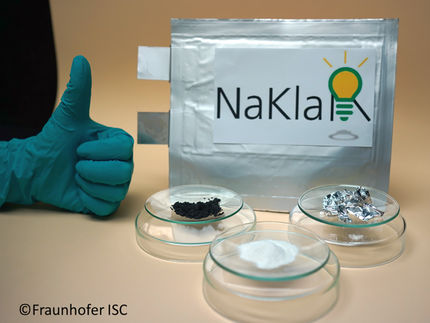New technology for solid state batteries
Qkera selected as one of the 25 best start-ups at Falling Walls
The start-up Qkera has developed new electrolyte components for solid state batteries. With high energy density, great stability and low production costs, the goal of the TUM spin-off is to achieve a breakthrough of this battery technology in electromobility and other areas. At the Falling Walls Science Summit, Qkera was selected as one of the 25 best science start-ups worldwide.
Battery performance is still regarded as the Achilles heel holding electromobility back from a decisive breakthrough. For many years the solid state battery has been seen as the potential game changer in that regard. Unlike conventional lithium ion batteries, these batteries use solid rather than liquid electrolytes. This promises greater energy density and, as a result, longer ranges and shorter charging times. But so far the technology has failed to make gains in the mass market.
The start-up Qkera wants to change that. The research team working at the e-conversion Cluster of Excellence has developed electrolyte components that will make it possible to produce batteries with energy densities that the team estimates to be 30 to 50 percent higher than that of conventional batteries. The components are also remarkably thin and stable. Equally important: The team has developed a manufacturing process that will facilitate low-cost production. The technology could be used not only in cars, but also in smartphones and laptops.
Qkera’s electrolytes consist of a lithium ion-conducting ceramic-oxide material. “In reality, it is practically the same material that a coffee cup is made of,” explains Jennifer Rupp, Professor of Solid State Electrolytes at the Technical University of Munich (TUM) and a co-founder of Qkera. This has benefits for safety and sustainability. Ceramics are practically non-inflammable and the batteries can be made without the rare earths that are often mined in crisis regions. “For example, our technology makes it possible to make high-performance batteries with lithium iron phosphate cathodes that actually show lower output than cobalt-based alternatives – and the material can be mined in Europe,” explains Dr. Andreas Weis, co-founder and CTO of Qkera.
Supported in a TUM Venture Lab
Jennifer Rupp has been working on this research topic over her entire career. “But at some point I realized that I would have to start my own company. Otherwise I would lose control of the technology.” In November 2023 Qkera was founded. “I conducted research in the USA for a long time and could have started a company there. But I wanted to do it in Germany,” says Jennifer Rupp. “We wanted to make our own contribution to help ensure that we in Europe would not be dependent on other countries with regard to energy storage.”
Qkera is receiving support in the TUM Venture Lab ChemSPACE. Each of the TUM Venture Labs specializes in an important technological field. They offer the start-up teams technical infrastructure geared to their specific needs, tailor-made training programs, expertise for the respective market and global networking with the industry. Qkera also received support with financing under the program Funding for Innovators, offered by UnternehmerTUM, the Center for Innovation and Business Creation at TUM.
“In the first year since founding the company we have made a huge number of technological advances,” says Andreas Weis. Production now takes place at less than half of the usual synthesis temperature and has been optimized at a high speed, which saves greenhouse gases and in turn reduces the impact on the climate. By the end of this year the company plans to send the prototype to battery manufacturers so that they can utilize Qkera components for various battery designs.
Winner at Falling Walls
The Falling Walls jury sees the team’s work as one of the most important scientific breakthroughs of the year. To mark the anniversary of the fall of the Berlin Wall on November 9, the Falling Walls Foundation hosts its annual Science Summit in Berlin around that date to promote public awareness of the walls being demolished in the world of science. It is regarded as one of the most important events for fostering discussions between the world of research and society at large and within the scientific community. Falling Walls selects the most important achievements in five research fields and in the Science Start-ups category. Qkera is one of just 25 companies selected from more than 1100 startups from around the world.
---
Did you already know? On November 13, virtual battery day 2024 will take place - the largest digital event on battery technology and electrochemical energy storage! Find out more now and join for free: https://www.virtual-battery-day.com/en/what-to-expect-as-visitor
Something is happening in the chemical industry ...
This is what true pioneering spirit looks like: Plenty of innovative start-ups are bringing fresh ideas, lifeblood and entrepreneurial spirit to change tomorrow's world for the better. Immerse yourself in the world of these young companies and take the opportunity to get in touch with the founders.
See the theme worlds for related content
Topic World Battery Technology
The topic world Battery Technology combines relevant knowledge in a unique way. Here you will find everything about suppliers and their products, webinars, white papers, catalogs and brochures.

Topic World Battery Technology
The topic world Battery Technology combines relevant knowledge in a unique way. Here you will find everything about suppliers and their products, webinars, white papers, catalogs and brochures.





























































